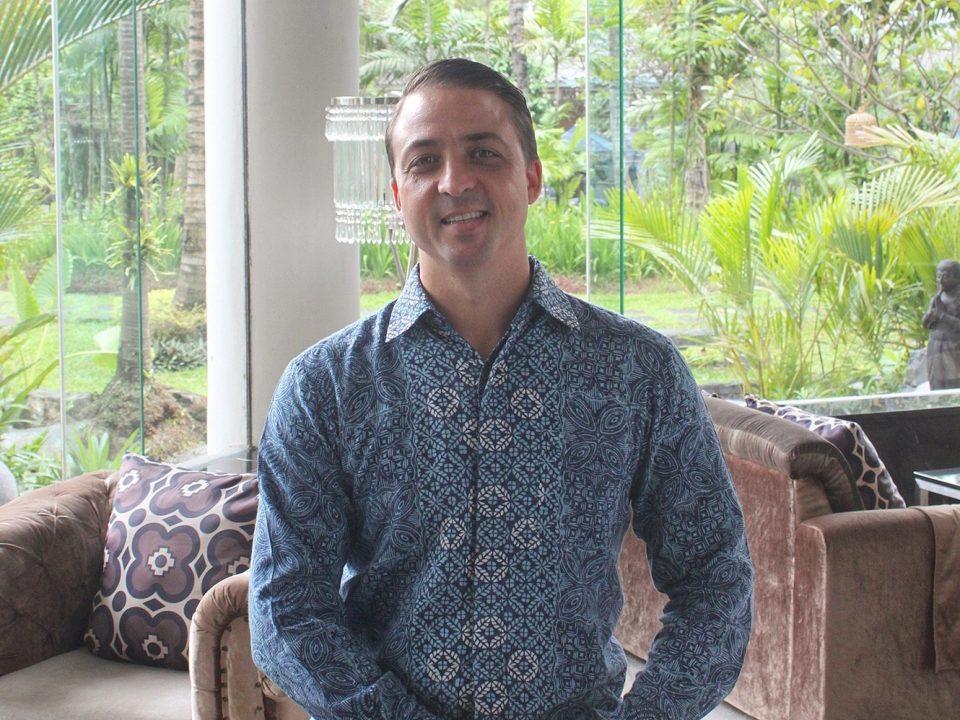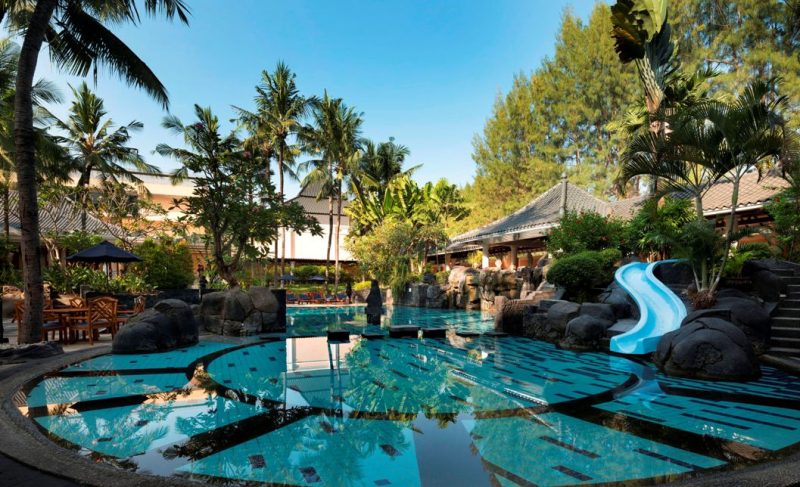“Together we can” is the philosophy that Spaniard Alvaro Berton constantly reminds himself and his team at Melia Purosani Hotel, Yogyakarta.
Always imagined himself working in Asia, Berton relocated to Bali and eventually Yogyakarta – the city of gudeg, the city of students. Indonesia Expat chit-chats with this hotel General Manager about his hotelier career, his time in Indonesia and his views on the country’s hospitality industry.
What did you think of Indonesia when you first arrived? What was your first impression of the country?
My arrival port in Indonesia was Bali in February 2014 and I felt at home from the first day. I come from a beach tourism destination in Spain, with a big resort complex similar to Nusa Dua, so the environment really felt familiar.
The kindness and desire to please others, from what I gathered from the people I met in Bali as well as in Jogja nowadays, was one of the first impressions I got about the country. I think it is one of the feelings the international visitors bring back home from Indonesia and spark their return here.
Why did you choose Indonesia for your career?
From the beginning of my hospitality career, I was looking for an opportunity to work in Asia, but it was very difficult for me to find it due to the restrictions on the working visa implemented for most of the positions.
Finally, I decided to move to the Dominican Republic to get additional experience and one year later, I got an offer from a hotel in Bali to join as the Cluster EAM and Revenue Manager. I did not have any doubt to accept the offer. Some days after receiving the offer, I was already in Indonesia.
What are the biggest challenges you face in your life in Indonesia as an expat? How are these things different to your home country or other countries in which you have lived and worked?
Frankly speaking, the challenges are similar to the ones you may find in any other part of the world. At first, you have communication and cultural challenges due to different languages and religions. But I always think that it’s our responsibility as expats to adapt ourselves to the new culture – part of our vital learning is to be able to integrate ourselves and our families.
Since my last destination was the Dominican Republic, I really value the safety feeling I have in Indonesia compared to other areas in the world.
What do you think of the hospitality business in Indonesia?
I think the opportunity to implement a healthy development of the hospitality industry is critical for the long term sustainability of the business in Indonesia.
During my first years in Bali, the number of available rooms on the island increased by over 30 percent. I think there is an opportunity to implement a different model not only based on the new licenses and constructions, but also in the maintenance and improvement of the offer, to guarantee the business, and also the availability of the limited sources.
What are Melia Purosani Hotel’s strengths?
In this case, we have three different factors from the other hotels in the city.
Our team is passionate and experienced, delivering excellence to our guests for more than 30 years. That is, for me, without any doubt the main pillar of our strength.
I will highlight as well our location, being the only five-star Urban Resort in the city centre; you can jump from our tropical garden and lagoon-style swimming pool to the busy Malioboro in a few steps.
And of course, our well-recognised brand, Melia Hotels & Resorts, with hotels in the main destinations in Indonesia and more than 25 hotels in Asia and 350 worldwide.
 What is the competition like in the local hotel industry? And what kind of strategies has the Melia Purosani Hotel implemented to keep up with the competition?
What is the competition like in the local hotel industry? And what kind of strategies has the Melia Purosani Hotel implemented to keep up with the competition?
The competition is very tough, especially during the last two years I’ve been managing the hotel while facing this pandemic situation. As a well-known international brand, we were historically targeting 35-40 percent of our business coming from international markets yet we have lost these potential customers.
We have changed our strategy to adapt ourselves more to the national market with different implementations to make ourselves more dynamic and flexible. We have launched our own hotel website in the Indonesian language www.meliajogja.com linked to the different services available in the hotel: rooms, spa, and restaurants. It’s a platform supporting direct contact with our clients offering fast and personalised communication.
Based on your experiences working in the hospitality industry, what are the keys to running a hotel successfully?
In my personal opinion, the key factors to success in the hospitality industry and any other big industries are teamwork and motivation. Every single person must be involved and passionate about doing their job at any time. Thus, they must feel happy and fairly treated, and that stems from our responsibility as leaders. We must be communicative, transparent, and available to our employees and then, of course, we must have the right set of attitudes to formulate actions and goals throughout the whole organisation.
In your opinion, what makes running a hotel in a touristy area like Yogyakarta different compared to doing so in urban places like Jakarta? And how are the guests different?
In both cases, we have a mix of customers visiting our hotels. We can divide them into two big segments: business and leisure. Maybe we can consider Yogyakarta a more leisure focus destination than Jakarta, but nowadays, we still have a very important Domestic Business segment in our city.
If we include the international market, we can probably conclude that it is much more leisure-oriented in Yogyakarta and more business-oriented in Jakarta, as it’s a Financial and Business Strategic city.
Who would you name as your mentors and influences? Why?
Probably one of the people responsible for my career was Mr Paco Piedras, one of my lecturers during my University period. He could explain the most difficult questions with the simplest words, for us not only to learn but to understand the right point of the explanation. He took part in the development of the first Melia hotels in the 60s, together with our founder Gabriel Escarrer, and he was responsible for the executive employee’s development.
Later, I had the opportunity to grow with great professionals who gave me the opportunity to become the general manager I am today: Antonio Baez, Juan A. Sánchez, and Adrian Prado. I keep part of them in my management model.
What is your philosophy on management and working with your team?
I can summarise in one sentence I often use with my team: “Together we can”.
“Together”, because as I mentioned previously, this is a job we develop as one unit, working all together to achieve an objective. We are all involved to achieve it, with our share of responsibility and our share of recognition.
“We can”, because without any doubt we know we will achieve it.
As an expat manager, do you find local language skills helpful in your line of work or can you manage without speaking Bahasa Indonesia?
Saya tidak bicara Bahasa Indonesia bagus sekali, tapi, saya mengerti cukup untuk percakapan. I don’t speak the Indonesian language that well, but, I understand enough to have conservations.
As you can see, my Bahasa Indonesia is not very good, but I can understand many words and can communicate with the locals who don’t speak English. I am worried it is not good enough for a business conversation yet.
Before coming to Indonesia, I never used English for work since I spoke Spanish in Spain and the Dominican Republic. I think it took more time for me to adapt to the English language first.
What advice would you give to Indonesians about living and working with expats? Any tips that might improve the relationship?
Well, I think we are the ones who may adapt ourselves to the country we arrive in and try to participate in the social and cultural activities. I’ve always felt well treated in any situation in Indonesia throughout my eight years.
In any case to understand one another, I think the best option is always to put yourself in the shoes of the other person. I always encourage people to travel and work in different countries. It is better to learn to understand others than your own experience.





 What is the competition like in the local hotel industry? And what kind of strategies has the Melia Purosani Hotel implemented to keep up with the competition?
What is the competition like in the local hotel industry? And what kind of strategies has the Melia Purosani Hotel implemented to keep up with the competition?